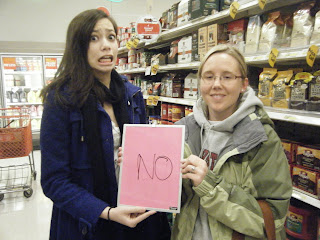
From Delaney:
When we were first given "Commonweal" as an assignment, I had absolutely no intention of attempting 31 hours without my cell phone. However, the combination of careless packing and a sudden trip home, forced me to do the unthinkable.
At first, I thought nothing of it. I have gone without a phone before, never for an entire weekend, but I assured myself nothing would be different. I remained distracted until my mother started checking her text messages. And then the shakes began. I suffered from serious telephone withdrawal, and I would find myself looking for something to distract myself with during boring conversations, only to remember that my "escape route" had been left behind. I changed my facebook status to something along the lines of "without phone", only to be greeted with numerous comments like, "Well that makes sense" "Good to know you aren't pissed at me" and my all time favorite "I thought you'd died". If it hadn't been for my home computer, I would have spent 31 hours with lack of communication to all of my friends from school, church, and otherwise.
I felt the pain of no cell phone the most when I went out with a friend. As we sat drinking coffee, I watched as she constantly interrupted our coversations in order to continue her virtual ones with people she saw everyday. And I felt like a loser. Across the table she sat, talking to 5 other people almost simautaneously, while I waited for her to finish, wishing the entire time I had my phone. My way to show her up and announce to the world that I too was in high demand! Although in reality, I would only be sending mindless text messages and fiddling with my background pictures. It was at this moment, I began to hate my phone dependency.
For the first time in a long time that weekend, I shared a meal with my parents, and none of us checked our phones. We discussed politics, that morning's church sermon, my future, to name a few. We were completly engaged with the task at hand, and for those few hours, we were each focused on each other. I felt connected with my family. And for the first time that weekend, I forgot I needed my phone. For the first time in a long time, the people I wanted to talk to, were right in front of me.
Am I dependent upon technology? Hell yeah. Though I had been aware of my dependency prior to this lab, these 31-48 hours made me realize the negative impacts technology is having on my life. Though my cellphone and computer are great in order to keep in touch with friends and family that are faraway, they are also great distractions and devalue face to face conversations. With my phone, I used to be annoyingly addicted, checking it regularly for messages. Without my phone, I found myself more aware of what was going on around me, and more apt to start conversations with people. It was nice to speak, instead of text.
Since doing this lab last weekend, I check my phone much less during the day, and instead of texting my parents, I call them. When I found my phone lying in the bottom of my dance bag Sunday night, I found 8 missed calls 5 voicemails and 17 new text messages. Then the battery died. And I left it to charge in the morning.

















